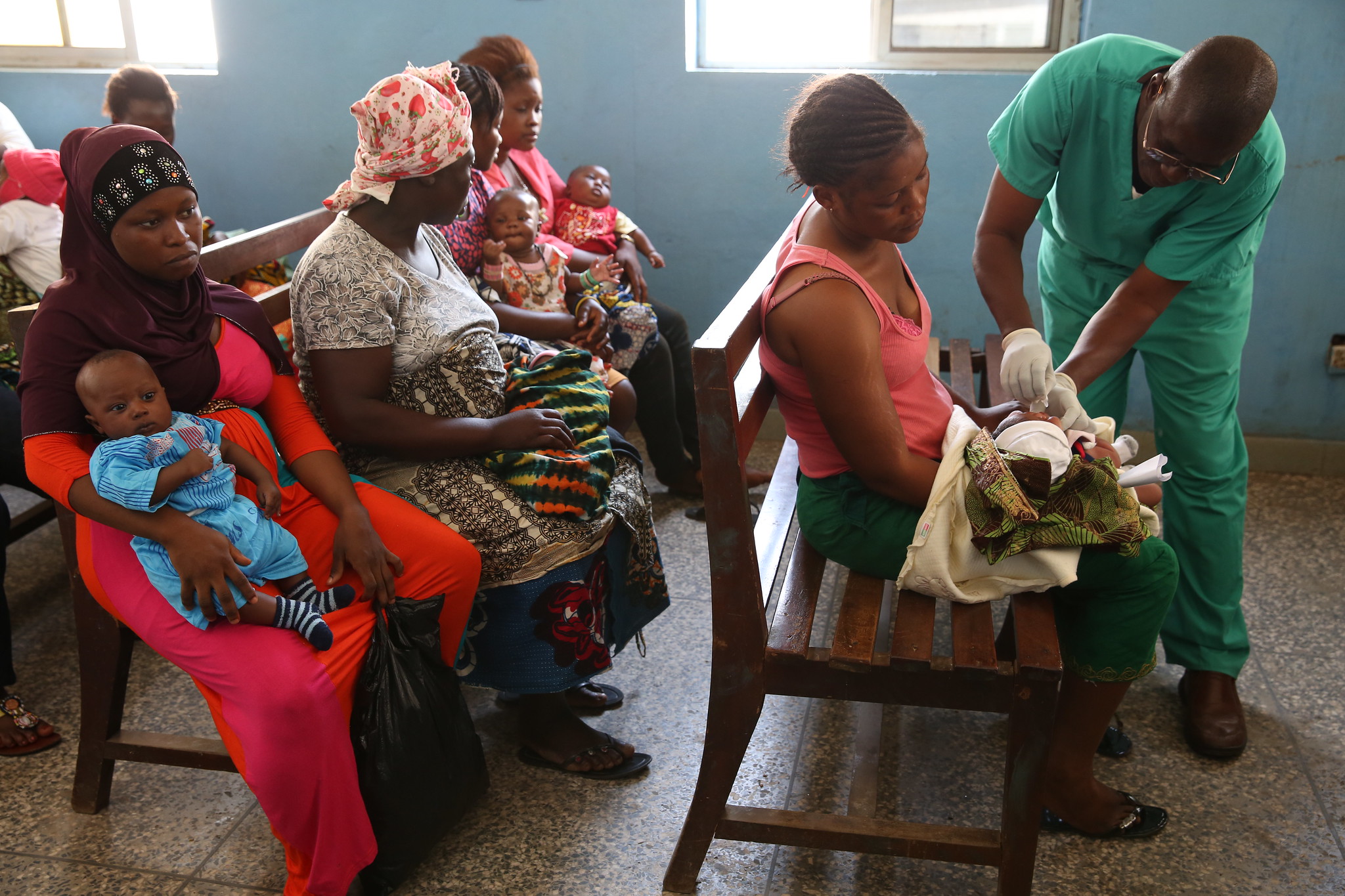Sub-study Impact of first-trimester malaria in pregnancy on the mother and infant
Sub-study Impact of first-trimester malaria in pregnancy on the mother and infant
This study group aims to determine the impact of malaria in the first trimester of pregnancy on the mother and infant through individual patient data meta-analysis (IPDMA).

The Impact of First-trimester Malaria in Pregnancy on the Mother and Infant, a sub-study of malaria in pregnancy infant study group, will reach out to interested researchers with relevant datasets.
The protocol, statistical analysis plan, and outcomes will be circulated among all group members before the analysis.
In 2020, 121·9 million pregnancies occurred in malaria transmission areas, resulting in an estimated 70·9 million (58·1%) live births.1 Whilst the literature on the risks associated with malaria infections in the second and third trimester of pregnancy is well characterised, less is known about infections in early pregnancy. However, there is growing evidence about the severe health impacts of first-trimester infections on the mother and her fetus.2 Plasmodium falciparum infection in early pregnancy impairs placental vasculogenesis and angiogenesis and impacts the ability of the placenta to support foetal growth.3-7 Poor maternal and infant outcomes associated with malaria infection in the first trimester include hypertensive disorders during pregnancy, maternal anaemia, pregnancy loss, preterm birth, intrauterine growth retardation, low birth weight, and infants born small for gestational age.2,5,7-15 Furthermore, this is the period in pregnancy when women are at the highest risk of malaria infection.16-19 Unfortunately, this is a period of pregnancy when the current prevention policy of intermittent preventive treatment with sulfadoxine-pyrimethamine is not yet indicated, and there can be provider/patient confusion on the safe use of antimalarials for malaria treatment.
A systematic review and individual participant data (IPD) meta-analysis on the risks and adverse pregnancy and infant outcomes associated with malaria infection in the first trimester of pregnancy may provide better evidence of the impact and burden of malaria in the first trimester. Synthesising this evidence is critical to drug developers, policymakers, and program managers to inform control strategies to inform the benefit-harm assessment of treatment options in this under-served group.
We propose to pool datasets from cohort studies or trials conducted in malaria-endemic areas in sub-Saharan Africa. Potentially eligible studies/datasets will be identified through a comprehensive literature search, and authors will be invited to contribute data and join the study group. We plan to assess the effect of first-trimester malaria infection (clinical or asymptomatic) with the main outcomes: Pregnancy loss (miscarriage and stillbirth), maternal anaemia (haemoglobin <11 g/dl, <8 g/dl), newborn low birth weight, preterm birth, and small-for-gestational-age. Additional outcomes can be read in the proposal.
Inclusion criteria
-Prospective cohort study or clinical trial in pregnant women with birth outcomes
-Participants present who have been enrolled at a gestational age < 14 weeks (i.e. < 13 weeks +6 days) and have malaria test results in the first trimester.
-Presence of an outcome of interest (pregnancy outcome, maternal anaemia or haemoglobin, infant birth weight or low birth weight, gestational age or prematurity at birth, Apgar score at birth, maternal hypertensive disorder or death, perinatal death, infant haemoglobin or anaemia, congenital malaria, foetal haemoglobin or anaemia, infant anthropometry at birth and /or at follow up, infant infections at follow up).
Exclusion criteria
-No pregnant women in the first trimester available with a malaria test result or only a very small sample (<30)
-All or almost all negative malaria test results in the first trimester (< 5 malaria positive cases)
-None of the outcomes available
Essential:
- Mother: Microscopy, RDT, LAMP, or PCR in the first trimester of pregnancy (< 13 weeks + 6 days determined by ultrasound, LMP or fundal height)
- Gestational age at first trimester event
- Malaria treatment received for this event (if any)
- Infant/mother: at least one of the outcomes of interest (pregnancy outcome, maternal anaemia or haemoglobin, infant birth weight or low birth weight, gestational age or prematurity at birth, Apgar score at birth, maternal hypertensive disorder or death, perinatal death, infant haemoglobin or anaemia, congenital malaria, foetal haemoglobin or anaemia, infant anthropometry at birth and /or at follow up, infant infections at follow up)
- Date of delivery and date of outcome data
Optional:
Mother:
- Age
- Gravidity/parity
- Urban/rural residence
- HIV infection status
- Malaria prevention: IPTp, ITN use, net use IRS
- Other documented malaria episodes in pregnancy and treatments
- Season
Infant:
- Gender
- Date of birth
- Birth weight
- Fever
- Gestational age at delivery
- HIV-status
Additional information needed
Procedures for malaria laboratory tests
These will be the same as for the Malaria in Pregnancy Infant Study. Note that this is a relative short sub-study, and we hope to have results before the end of 2024 to be able to assist policy makers.
1. Reddy V, Weiss DJ, Rozier J, Ter Kuile FO, Dellicour S. Global estimates of the number of pregnancies at risk of malaria from 2007 to 2020: a demographic study. Lancet Glob Health 2023; 11(1): e40-e7.
2. Rogerson SJ, Meshnick S. Malaria in Pregnancy: Late Consequences of Early Infections. J Infect Dis 2019; 220(9): 1396-8.
3. Weckman AM, Ngai M, Wright J, McDonald CR, Kain KC. The Impact of Infection in Pregnancy on Placental Vascular Development and Adverse Birth Outcomes. Front Microbiol 2019; 10: 1924.
4. Moeller SL, Nyengaard JR, Larsen LG, et al. Malaria in Early Pregnancy and the Development of the Placental Vasculature. J Infect Dis 2019; 220(9): 1425-34.
5. Griffin JB, Lokomba V, Landis SH, et al. Plasmodium falciparum parasitaemia in the first half of pregnancy, uterine and umbilical artery blood flow, and foetal growth: a longitudinal Doppler ultrasound study. Malar J 2012; 11: 319.
6. McClure EM, Meshnick SR, Lazebnik N, et al. A cohort study of Plasmodium falciparum malaria in pregnancy and associations with uteroplacental blood flow and fetal anthropometrics in Kenya. Int J Gynaecol Obstet 2014; 126(1): 78-82.
7. Schmiegelow C, Matondo S, Minja DTR, et al. Plasmodium falciparum Infection Early in Pregnancy has Profound Consequences for Fetal Growth. J Infect Dis 2017; 216(12): 1601-10.
8. Huynh BT, Cottrell G, Cot M, Briand V. Burden of malaria in early pregnancy: a neglected problem? Clin Infect Dis 2015; 60(4): 598-604.
9. Harrington WE, Moore KA, Min AM, et al. Falciparum but not vivax malaria increases the risk of hypertensive disorders of pregnancy in women followed prospectively from the first trimester. BMC Med 2021; 19(1): 98.
10. Accrombessi M, Yovo E, Fievet N, et al. Effects of Malaria in the First Trimester of Pregnancy on Poor Maternal and Birth Outcomes in Benin. Clin Infect Dis 2019; 69(8): 1385-93.
11. McGready R, Lee SJ, Wiladphaingern J, et al. Adverse effects of falciparum and vivax malaria and the safety of antimalarial treatment in early pregnancy: a population-based study. Lancet Infect Dis 2012; 12(5): 388-96.
12. Moore KA, Simpson JA, Wiladphaingern J, et al. Influence of the number and timing of malaria episodes during pregnancy on prematurity and small-for-gestational-age in an area of low transmission. BMC Med 2017; 15(1): 117.
13. Huynh BT, Fievet N, Gbaguidi G, et al. Influence of the timing of malaria infection during pregnancy on birth weight and on maternal anemia in Benin. Am J Trop Med Hyg 2011; 85(2): 214-20.
14. Valea I, Tinto H, Drabo MK, et al. An analysis of timing and frequency of malaria infection during pregnancy in relation to the risk of low birth weight, anaemia and perinatal mortality in Burkina Faso. Malar J 2012; 11: 71.
15. Cottrell G, Mary JY, Barro D, Cot M. The importance of the period of malarial infection during pregnancy on birth weight in tropical Africa. Am J Trop Med Hyg 2007; 76(5): 849-54.
16. Accrombessi M, Fievet N, Yovo E, et al. Prevalence and associated risk factors of malaria in the first trimester of pregnancy: A preconceptional cohort study in Benin. J Infect Dis 2018; 217(8): 1309-17.
17. Hounkonnou CPA, Briand V, Fievet N, et al. Dynamics of Submicroscopic Plasmodium falciparum Infections Throughout Pregnancy: A Preconception Cohort Study in Benin. Clin Infect Dis 2020; 71(1): 166-74.
18. Tuikue Ndam N, Tornyigah B, Dossou AY, et al. Persistent Plasmodium falciparum Infection in Women With an Intent to Become Pregnant as a Risk Factor for Pregnancy-associated Malaria. Clin Infect Dis 2018; 67(12): 1890-6.
19. Leuba SI. Predictors And The Effects On Maternal And Birth Outcomes Of Plasmodium Falciparum Infection In The First Trimester Among Nulliparous Women From The Democratic Republic Of The Congo, Kenya, And Zambia [PhD]: University of North Carolina at Chapel Hill Graduate School; 2021.



